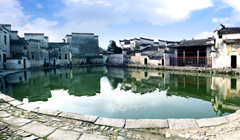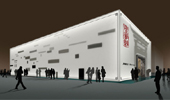Line Eight: Tour to Dabie Mountain revolutionary bases
 Introduction to the spots
Introduction to the spots
|
From past to now, Lu'an cultivates many heroes such as Wen Weng who accelerated cultivation in Sichuan, Li Gonglin who was top in painting during the Song Dynasty, Sun Jia'nai who was the teacher to an emperor and Fang Zhenwu and Sun Liren, two generals who bravely fought the Japanese. In 1950s when the generals were conferred, 108 of them are from Wanxi. There are altogether 6 towns of generals and Lu'an has two of them. Lu'an is the home for the brave generals. |
★ Dabie Revolutionary Historical Memorial Park ★
The park is on the bank of Jiuduntang in the center of Lu’an city. It covers 107 mu and was first built in 1953. The cemetery consists of a memorial section and viewing section. Memorial section is in the center of the cemetery and it contains the cenotaph of martyrs, a sculpture of the sculpture of Martyr Xu Jishen, a showroom listing the heroic deeds of 108 generals from Wanxi, a grieving square, monuments, porches and some other memorial constructions. In the showroom, there are 263 documents of famous martyrs, 300 pieces of relics and pictures of martyrs, 500 books and other files, 1083 bills and tickets, over 100 weapons of which 13 are Class A revolutionary relics of the state. The glancing section surrounds the showroom and consists of Riyue Lake, Gongxin Bridge and an amusement park.
★ Dushan Revolutionary Site ★
The site is located in Dushan county in Lu’an city and is an AAAA-level touring area of the state. It is one of the 100 key scenic areas of red classics of the state (the color red represents China’s revolutionary history) and also an important point in the 30 key routes of red classics of the state. The site is where the Dushan rebellion took place. The site is comprised of three parts: the modern display part whose main part is Liuhuo Uprising Memorial Hall, the history part whose core are the revolutionary relics and memorial part whose main part is Liuhuo Uprising cenotaph. There are 9 revolutionary relics in total: one Liuhuo Uprising Memorial Hall, one Liuhuo Uprising cenotaph, Longxugou. The other spots, located on the west and middle street, are key relics under state protections. These streets form a relatively separate historical and cultural protection zone. At this site, you’d be able to get a full of what government system is like during the Party’s early agrarian revolution. Anhui Province has only one site like this and only a few others could be found in other parts of the country.
★ Jinzhai the Red Army Square ★
It is an AAAA-level scenic area and a relic site under provincial protection. The area is located in Meishan in Jinzhai county and covers an area of 250000 square meters. There are 6 parts in it: a cenotaph for martyrs, museums, Memorial Hall of the Red Army, cemetery of Red Army martyrs, cenotaph of General Hong Xuezhi and Red Army Square. In 1995 it is listed as one of the 100 “patriotism education bases” and “patriotism education bases for teenagers” by Ministry of Civil Affairs and the Central Committee of the Youth League and “patriotism education bases for young officers” by Nanjing Military Region. In 1996, it was preserved as a key memorial construction for martyrs under state protection by the State Council. In 2005, it is made one of the 100 classic scenic areas of Red Tour of the state. In 2006, the Propaganda Department named it as a patriotism education base model..
★ Tiantangzhai Liu-Deng Army Headquarter Site ★
The site is located in Jinzhai county and covers 24256 square meters in two parts: the headquarters and memorial sculptures and a square.
The main building of Liu-Deng Army Headquarter was rebuilt to its original condition with bricks and wood and the floor is paved with newer bricks. The building is divided into 5 parts and visitors can go freely without worrying of being caught by the rain.
The exhibition in the headquarters centers on Liu-Deng Army moving into Dabie Mountain with pictures and relics, which would give the visitors a vivid idea of how they managed to harvest victories one by one under the harsh conditions. The exhibition hall is divided into 3 parts: Moving into Dabie Mountain part, war meeting part and the founding generals’ part, who were from Jinzhai. The living quarters of Liu Bocheng and Deng Xiaoping have also been restored. The exhibition is rich in pictures, documents and relics.
★ Wanfo Lake ★
Wanfo Lake scenic area is a sightseeing spot centering on Wanfo Lake. The scenic area covers 299 square kilometers and the lake occupies 50 square kilometers. Also known as Longhekou Reservoir, Wanfo Lake is an important part of the famous Pi-Shih-Hang Irrigation Project and one of the 10 reservoirs in Anhui Province. The lake is famous for its picturesque scenery. There are over 60 islands in it and most of them are currently being developed. The water in the lake is very clear and it can be drunk straight out of. There are also many natural and historical sights along the lake which are well worth visiting. The beach is a good place for swimming and sunbathing activities.
★ Yuexi the Red Army 28 Military Site ★
It is one of the 100 classic scenic areas of Red Tour and rests in Yaoluoping, a nature reserve under state protection in Yuexi county, which is 60km away from Yuexi county. It is the base for the Red Army 28 from 1935 to 1937 during its guerrilla warfare in Hubei, Henan and Anhui.
After the rebuilding of Red Army 28 in Liangting’ao in Yuexi, Political Commissar Gao Jingting led them for a guerrilla warfare which lasted 3 years. Niejia Laowu, where Gao Jingting once lived, has been restored as it was along with the trenches in the backyard. Red Army 28 Exhibition Hall, a parking lot, entrances and the center squares were constructed. The exhibition hall covers 800 square meters and is made up of 4 showrooms, Red Army 28 buildings showcasing its three year battle in Hubei, Henan and Anhui, negotiation in Yuexi and reorganization in Qiliping separately. Since the introduction of advanced technology, over 170 pictures and more than 250 relics are displayed, 20 of which are of high value.
Editor: Li Jing

 What's so special about the line
What's so special about the line

